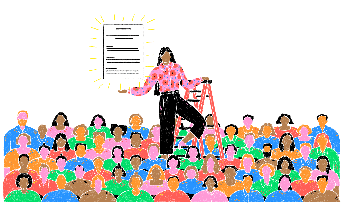
This post is part of TED’s “How to Be a Better Human” series, each of which contains a piece of helpful advice from people in the TED community; browse through all the posts here.
Imagine you’re at a family reunion.
You’re catching up with your aunt when you look over to see your three-year-old grab a toy away from another child. After you send your toddler off for a time-out, a cousin pulls you aside and says, “I think you could have handled that better” and gives you a lesson in disciplining children.
How would you feel?
Odds are, you wouldn’t be grateful. No one likes to be lectured.
What’s ironic is even though we can all see that receiving this kind of unsolicited advice is a giant downer, most of us have done this. It’s common to give out advice when we see someone struggling.
Even underperforming salespeople, C students and spendthrifts offered smart strategies. They knew what to do to overcome their problems; they just weren’t doing it.
A few years ago, I met a graduate student who had a hunch we’d gotten the formula backward. Lauren Eskreis-Winkler, a former competitive pianist and Ivy Leaguer, was always a high achiever and found it baffling that so many of her talented peers struggled to meet their goals.
As a PhD student in psychology, she wanted to understand what separates top performers from the rest of us, so she began collecting data. She surveyed Americans struggling to save more money, lose weight, control their tempers and find employment. She interviewed salespeople and high school students and asked everyone what might motivate them to be more successful at work, at home and in their academic pursuits.
Lauren made a surprising discovery: When it came to being more successful, people had plenty of good ideas for how to do it. Even underperforming salespeople, C students and spendthrifts offered smart strategies in the areas where they were struggling. They knew what to do to overcome their problems; they just weren’t doing it.
Lauren began to suspect this failure to act had to do with a self-doubt — or what the legendary Stanford psychologist Al Bandura has called “a lack of self-efficacy.”
Self-efficacy is a person’s confidence in their ability to control their own behavior, motivation and social circumstances. Goal strivers are sometimes plagued by insecurity; in fact, a lack of self-efficacy can prevent us from setting goals in the first place.
Too often, we assume the obstacle to change in others is ignorance, so we offer advice. But what if the problem is a lack of confidence?
Research confirms the obvious: When we don’t believe we have the capacity to change, we don’t make as much progress changing. One study demonstrated that when trying to lose weight, people who report more confidence in their ability to change their eating and exercise habits are more successful. Another study showed that science and engineering undergraduates with higher self-efficacy earn higher grades and are less likely to drop out of their majors.
Recognizing this gave Lauren an idea. Too often, we assume the obstacle to change in others is ignorance, so we offer them advice. But what if the problem isn’t a lack of knowledge but a lack of confidence — and our unsolicited wisdom isn’t making things better but worse?
As a psychologist, Lauren knew that people are quick to infer implicit messages in the actions of others. In giving advice, we might be inadvertently conveying to people that we don’t think they can succeed on their own. She wondered: What if we flipped the script?
If giving advice can destroy confidence, then asking people who are struggling to be advisers instead of advisees might be a better approach. Encouraging someone to share their wisdom conveys they’re intelligent, capable of helping others and the kind of person who succeeds. It shows we believe in them.
Lauren ran survey after survey of Americans with unmet goals — like saving more, controlling their tempers, getting fit or finding new jobs. She found that most people predicted that receiving advice would be more motivating than giving it, explaining why we’re all the targets of unsolicited advice. But when she examined this belief, using controlled experiments, she found it was wrong. As she’d suspected, prompting goal seekers to offer advice led them to feel more motivated than when they were given advice.
Our strategy had worked: The students who had given a few minutes of advice performed better in these classes than other students!
Of course, it was possible that Lauren’s idea wouldn’t really help people reach their goals. In 2018, I teamed up with Lauren, Angela Duckworth and Dena Gromet on a massive experiment aimed at helping students achieve their academic goals.
On the day of the experiment, shortly after the start of a new school term, nearly 2,000 students in seven Florida high schools walked into a computer lab. Some filled out short digital questionnaires, but others did something different — they were asked for their advice.
This group of students was invited to offer guidance to their younger peers through a 10-minute online survey. They were asked questions such as “What helps you avoid procrastinating?” “Where do you go to do focused studying?” and “What general tips would you give someone hoping to do better in school?”
After completing these surveys, the students went through the remainder of the term. Then, at the end of the marking period, we downloaded their grades in the class they’d told us was most important to them and their grades in math. Our strategy had worked: The students who had given just a few minutes of advice performed better in these classes than other students!
To be clear, giving advice didn’t turn C students into valedictorians, but it did boost performance for high schoolers from every walk of life. Strong students, weak students, students in the free lunch program and students from wealthier families — all of them saw small improvements in their grades after advising peers.
Anecdotally, we also heard that giving advice brought students joy. High schoolers in our study told their teachers they’d never been asked for their insights before and loved it. “Could we do this again soon?” they prodded hopefully.
The more Lauren reflected on her research on the power of advice giving, the more it made sense. Being asked to give advice conveyed to people that more was expected of them, boosting their confidence. And based on the interviews she’d previously conducted, Lauren also knew that people were capable of producing useful insights about how to tackle the same goals they themselves struggled with — recall the good advice she got even from underperforming salespeople and other strivers. This is a key reason why giving advice to others tends to help us.
In psychology, we call it the “saying-is-believing effect.” After you say something to someone else, you’re more likely to believe it yourself.
Another is we tend to tailor the advice we give based on personal experience. If asked for dieting suggestions, a vegan will likely offer plant-based tips. If asked about staying in shape, a busy executive will probably recommend an efficient regimen. In short, when someone asks for guidance, we tell them what we would find useful. After offering our advice, we feel hypocritical if we don’t try it ourselves. In psychology, we call it the “saying-is-believing effect.” After you say something to someone else, you’re more likely to believe it yourself.
Here’s a question you might have: What if no one ever asks you for advice? How can you use Lauren’s insight to help yourself succeed when it depends on something out of your control — namely, other people?
The good news is it’s possible to harness the power of advice giving to help yourself. One way is by forming an advice club: a group of people whose members regularly consult one another for help. I did it myself, long before I knew about Lauren’s research.
In 2015, I learned from economist Linda Babcock that women tend to bear the brunt of low-prestige office tasks, like planning the holiday party, taking notes at meetings and serving on committees. (This is true across industries and cultures.) To save herself from this fate, Linda formed an advice club with four female colleagues so they could help one another say no to these tasks.
As you provide and receive advice, you’ll boost one another’s confidence and unearth ideas that help with your own problems.
I was so impressed by the idea that I asked two faculty friends — Modupe Akinola and Dolly Chugh — to join a similar club with me. We pledged to help one another make tough calls when any of us got invited to do something time-consuming outside our teaching and research responsibilities. Now, when one of us is asked to deliver a talk, write a blog post or give an interview, we reach out to our “No Club” to discuss if the opportunity is worthwhile and get advice on how to turn it down if it isn’t.
The advice I’ve received from the club is invaluable, but I’ve also reaped huge benefits from giving advice. Helping my colleagues has boosted my confidence that I can judge when it’s right to say no, so I lean on them less and less. I’ve also benefited from the “saying-is-believing effect.” After encouraging someone not to waste her time giving a lecture on a topic outside her core area, I’d feel ridiculous saying yes to a similar invite myself.
You might consider forming an advice club with friends who are struggling to achieve goals similar to your own. As you provide and receive solicited advice, you’ll boost one another’s confidence and unearth ideas that help with your own problems.
Another simple suggestion is to turn advice giving inside out when you’re facing a challenge. Ask yourself: “If a friend or colleague were struggling with the same problem, what advice would I offer them?” Taking this perspective can help you approach the same problem with greater confidence and insight.
Adapted from the new book How to Change: The Science of Getting from Where You Are to Where You Want to Be by Katy Milkman; foreword by Angela Duckworth, in agreement with Portfolio, an imprint of Penguin Publishing Group, a division of Penguin Random House LLC. Copyright © Katherine L. Milkman 2021.
Watch Dr. Katy Milkman’s TEDxPenn Talk here:












